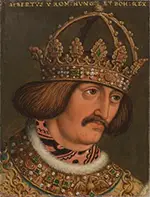Albert II: King of Germany
Albert II of Germany was King of Germany for a short time in the early 15th Century. He was born on Aug. 19, 1397, in Vienna. His father was Albert IV, Duke of Austria, and his mother was Joanna Sophia of Bavaria. 
Albert senior died in 1404, and young Albert became Duke of Austria despite being only 7. He had a series of uncles as regents and then assumed his own rule in 1411. In 1422, Albert married Elisabeth of Luxembourg, whose father was the reigning King of Germany, Sigismund. That monarch was also King of Bohemia and later ruled Hungary and the entire Holy Roman Empire, so Albert was next in line to inherit several thrones. Sigismund played a leading role in ending the Great Schism, a huge argument within the Catholic Church that had resulted in two sets of popes, one in Avignon and the other in Rome. Sigismund helped bring all parties together at the Council of Constance, a four-year series of meetings that resulted in the abdication of the rival popes and the declaration of just one new one. One result of the end of the religious struggle was the death of the prominent reformer Jan Hus. Many sources say that Sigismund had guaranteed Hus safe passage to and from the meeting that healed the Catholic schism; however, Hus was captured nonetheless and executed. His supporters fanned the flames of revolt, and Bohemia and surrounding lands were consumed in a handful of wars for the next few decades. Albert assisted his father-in-law in these struggles. Sigismund died in 1437, having designated Albert as his successor, and Albert took the Hungarian throne and the Bohemian throne a few months apart. He was fighting against Poland when German electors chose him as their king, on March 18, 1438. He served in that capacity until he died, on Oct. 27 1439, in Nezmély, Hungary, fighting the Turks. Among his prime achievements were the ending of private warfare and feuds and the division of Germany into administrative circles, from which his successors benefited much more than he did. Albert and Elisabeth had had four children, three of whom survived into adulthood: Anne (1432), Elisabeth (1438), and Ladislaus (1440). |
|
Social Studies for Kids
copyright 2002–2024
David White




